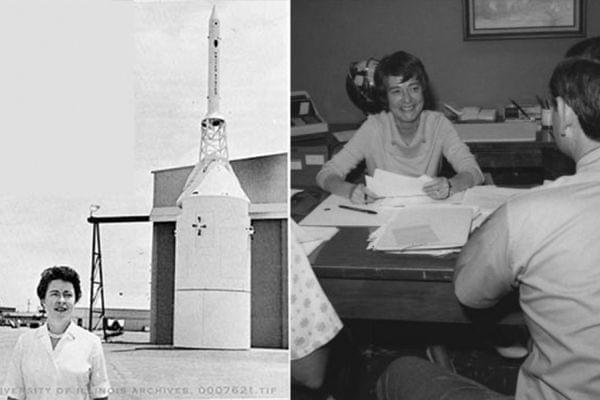An Illinois Woman’s Role In The Moon Landing; ‘Sober Curious’ And Non-Alcoholic Drinks; NCAA Coaches And Health Decisions

Barbara Crawford Johnson walks past Apollo spacecraft simulator en route to her office at North American Aviation in 1963, where she heads the department responsible for plotting the return course of the Apollo moon rocket (left). Barbara Crawford Johnson speaks to co-workers in her office, circa 1970-1974 (right). Wikimedia Commons(CC BY-SA 4.0)
50 years ago, an Illinois engineer named Barbara Crawford Johnson helped land astronauts on the moon. We learn about her life, and what it was like to work on the space program all those years ago. Plus, there are many reasons why people don’t drink alcohol, and those numbers of people continue to grow. We talk about how bars and restaurants are starting to cater cocktails to the sober set. Also, a new study finds that just half of collegiate level sports programs follow the medical model of care for student athletes.
Fifty years ago this week, Americans switched on their radios and TVs to follow the Apollo 11 mission. We’ve been hearing lots of commemorative stories about this time, and especially about the men who landed on the moon.
But what about the women who helped get them there?
Barbara Crawford Johnson or “Bobbie,” as she was known, was born in Sandoval, Illinois and graduated from the U of I. She supervised some of the engineering at the Apollo Lunar Landing Program.
Angie Wolters featured Bobbie in her book, Women and Ideas in Engineering: Twelve Stories from Illinois. She’s the director of Women in Engineering at the Grainger College of Engineering. Zach Putnam is an assistant professor of aerospace engineering.
When Angie's students read about Bobbie Johnson, "they're saying they loved how she pushed the envelope. They love how she had a can-do attitude. They saw how she really worked hard to evolve her skills and be successful," Wolters says. https://t.co/liFtGPdEuJ
— The 21st (@21stShow) July 18, 2019
Also--
There can be many different reasons for someone to stop drinking alcohol. Maybe they’re concerned about health or addiction or maybe they’re just curious what it would be like. Whatever the reason one thing seems to be clear: more people are trying sobriety.
About half of U.S. adults, and two thirds of young adults, say they’re trying to drink less. That’s according to data from Nielsen. Companies in the alcohol industry seem to be taking note as well. Heineken and Budweiser recently rolled out no-alcohol beers, and a number of craft breweries are experimenting with low-alcohol options. There’s also been an emergence of sober bars which provide the social scene minus the alcohol.
Ruby Warrington is the author of the book Sober Curious and she also hosts a podcast by the same name. Rachel Sugar wrote about her exploration of sobriety and non-alcoholic drinks for Bon Appetit. Chris Scott is the sober living house manager for New Directions Addiction Recovery Services. He is also involved with The Other Side, which is a sober bar in Crystal Lake, Illinois.
.@rtsugar has begun sneezing when she drinks: "It started when I turned 30, and that's my life now."
— The 21st (@21stShow) July 18, 2019
Read about her quest for non-alcoholic libations that are still appealing:https://t.co/2wolFAix6w
"When I found myself in this questioning relationship with alcohol, outside of 12-step programs there were very few places I could talk about my experience," Ruby Warrington says of creating Sober Curious.
— The 21st (@21stShow) July 18, 2019
Read about her journey here: https://t.co/FIRFQ0Ctl8
If you're looking for help around alcohol or drug use, you can call the National Council on Alcoholism and Drug Dependence Hope Line: 1-800-NCA-CALL or 1-800-622-2255.
Plus--
College sports are big business in our country. How big? Every year the NCAA, the nonprofit that runs college athletics, takes in close to $8 billion. Alabama football coach Nick Saban took home a salary of more than $8 million last year.
Here in Illinois, U of I football coach Lovie Smith signed a six-year, $21 million contract in 2016. His current salary puts him in the top 15 highest paid coaches in college football. He also got a $1 million bonus this year.
But, all that money means more pressure on coaches and athletes to produce success.
Now, a new survey from the Intercollegiate Council for Sports Medicine finds that coaches of college teams sometimes pressure trainers over their medical decisions. About three in five of the athletic trainers surveyed said they had been pressured at some point by non-medical personnel about athlete health, with many saying it happened more than twice a month.
These decisions can have deadly consequences for the players involved. Overworked athletes can land in the hospital or even lose their lives if their health is not prioritized.
Dave Ridpath is an Associate Professor of Sports Management at Ohio University where he teaches about intercollegiate athletics.
"This happens quite often when the coaches come in. They want to set their 'I'm a tough guy/girl' standard. They end up essentially torturing these athletes," @drridpath says.
— The 21st (@21stShow) July 18, 2019
These decisions can lead to overexertion or worse: https://t.co/WW2QPouVdZ
